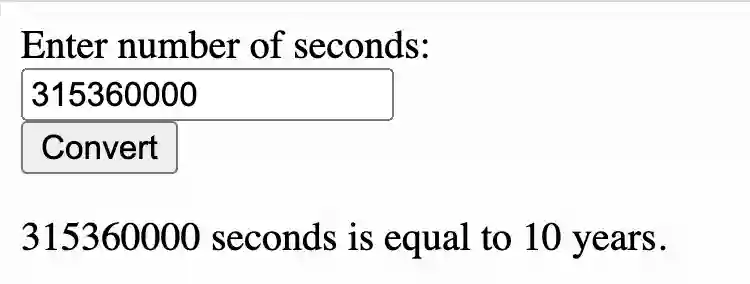Kodeclik Blog
How to convert seconds to years
Converting seconds into years involves a straightforward calculation that proves useful in various scientific contexts and everyday scenarios alike. Whether determining the age of celestial bodies or simply gauging the passage of time, mastering the conversion from seconds to years is a fundamental skill. Here’s a comprehensive guide to help you seamlessly make this conversion.
Understanding the conversion
To convert seconds to years, it's crucial to grasp the relationship between these units of time:
Seconds (s): The fundamental SI base unit for measuring time intervals.
Years (yr): A unit of time corresponding to the duration of one complete orbit of Earth around the Sun, accounting for leap years and the 365.25 days it encompasses.
Conversion Formula
This formula breaks down as follows:
60 seconds in a minute
60 minutes in an hour
24 hours in a day
365.25 days in a leap year (accounting for the additional day every four years)
By dividing the number of seconds by the total number of seconds in a year, accounting for leap years, you accurately determine the equivalent time in years.
Using Conversion Tools:
Online calculators and conversion tools simplify this process, ensuring accuracy and efficiency in converting seconds to years without manual calculations.
Real-world applications
Mastering seconds to years conversion is invaluable in scientific fields such as astronomy and geology. It aids in determining the age of celestial objects, estimating the lifespan of stars based on their radiation periods and transitions between hyperfine levels, and even understanding geological time scales.
Use the live form below to explore conversions between seconds and years.
Convert Seconds to Years
(Type in either textbox to convert)
How do we convert seconds to years? Let us think through this in a series of steps. First, you convert seconds to minutes, then minutes to hours, hours to days, and finally days to years. Here's a breakdown of the conversion process.
First convert seconds to minutes. There are 60 seconds in a minute.
Then, convert minutes to hours. There are 60 minutes in an hour.
Next, convert hours to days. There are 24 hours in a day.
Finally, convert days to years. In a regular year, there are 365 days.
Thus we need to perform a series of divisions, first by 60, then by 60 again, then by 24, and finally by 365. In total we are dividing by 60 times 60 times 24 times 365, or 31,536,000.
This relationship can be expressed mathematically as y = s/31,536,000, where s is the number of seconds and y is the number of years.
Converting seconds to years in Javascript
Let us write a simple Javascript program and embed it in a form so you can use it to do your own calculations! This program is a vanilla one that has the same functionality as the form above but without the styling, error catching, etc.
This code creates a simple HTML form with a label, an input textbox, and a button. When the button is clicked, the convert() function is called. This function retrieves the value of the input textbox, converts it to years, and displays the result in a paragraph element with the id "result". As mentioned earlier, the conversion is done by a series of divisions, viz. the number of days in a year (365), the number of hours in a day (24), the number of minutes in an hour (60), and the number of seconds in a minute (60). The form and results will look like:

Note that this code assumes that the input is a valid number. It does not perform any input validation or error handling. Don’t try silly things like negative numbers - it will work but the results are not particularly meaningful. Similarly if you give a non-number as input it will result in NaN results (Not a Number).
Converting seconds to years in Python
Here's a Python function that takes the number of seconds as input and returns the number of years:
In this Python function, we divide the input seconds by 60 to get the number of minutes, then divide by 60 again to get the number of hours, then divide by 24 to get the number of days, and finally divide by 365 to get the number of years.
Here are some examples of using this Python function:
There are other ways to convert seconds to years in Python, such as using the time module or the timedelta class from the "datetime" module. However, the seconds_to_years function we have written is a simple and straightforward way to perform this conversion.
Conclusion
Converting seconds to years offers insight into time scales ranging from micro to macro. It deepens your understanding of temporal concepts and their applications in scientific research, historical chronology, and everyday life. Whether you're exploring cosmic phenomena or reflecting on personal milestones, knowing how to convert seconds to years enriches your appreciation of time's profound impact on our world.
If you liked this blogpost, learn how to convert days to seconds!
Want to learn Javascript or Python with us? Sign up for 1:1 or small group classes.